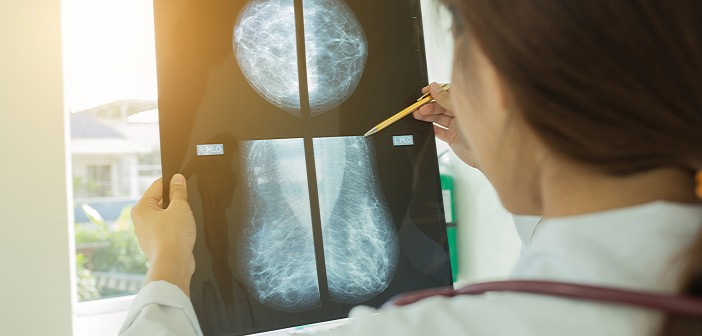In the U.S., breast cancer is the most commonly diagnosed cancer, excluding skin cancers, and the second-highest cause of death in women, behind lung cancer.1 Prevention measures for breast cancer screening have advanced remarkably over the last decade, primarily due to the advanced techniques developed to identify women at risk for or with evidence of breast cancer.
There have been remarkable advancements in genetic
cancer screening and advanced radiologic techniques.
The recommendations for mammography have changed in recent years, and may not always be in agreement. For instance, the U.S. Preventive Services Task Force recommend screenings every other year for women 50 to 74 years;2 however, the American Cancer Society recommends regular screening annually for women 45 to 54 years with an average risk of breast cancer and that women 55 years and older should be screened every other year, or have the opportunity for annual screening.3
We also now know that breast cancer can occur more frequently in certain families, or be clustered with other types of cancers in families, which has led to remarkable advancements in genetic screening and advanced radiologic techniques. There are a number of risks for breast cancer,4 such as the risk increases after age 50 and in women who are sedentary or overweight after menopause. Additionally, those with a first degree relative, such as a mother, sister, or even male relatives with breast cancer, are at increased risk.4 At particular high risk for breast or ovarian cancers, however, are those women who have genetic mutations called BRCA 1 or BRCA 2, or of Ashkenazi Jewish heritage. About half of all women with these mutations will get breast cancer by the age of 70, compared to only seven out of 100 women in the general population.5
Testing for the BRCA mutation has been available since 1996, and is the first genetic test for cancer used clinically. One screening tool that can be used for this type of testing is the Breast Cancer Genetics Referral Screening Tool (B-RSTTM).6 If you have a high risk for breast cancer, a magnetic resonance imaging test (MRI) has recently been found to be useful for early detection of tumors. MRI would be used along with mammograms to improve the sensitivity of the screening tests. Further, there may be medication, or even surgery, that can prevent breast cancer onset. Again, these options are for those women with genetic mutations.
So, should every woman get screened for BRCA mutations? No, but you should know when to talk to your doctor about genetic counseling. For all women, however, the following preventive measures can decrease your breast cancer risk:
- Keep a healthy weight.
- Exercise regularly (at least four hours a week).
- Get regular sleep.
- Don’t drink alcohol, or limit alcoholic drinks to no more than one per day.
- Avoid exposure to chemicals that can cause cancer (carcinogens) and interfere with normal body function.
- Limit exposure to radiation from medical imaging tests like X-rays, CT scans, and PET scans if not medically necessary.
- If you are taking hormone replacement therapy or oral contraceptives (birth control pills), talk to your doctor to make sure it is right for you.
- Breastfeed your children, if possible.
Overall, I recommend that women discuss screening options with their primary care provider or gynecologist to decide what is best, including any family history of breast cancer or cancer syndromes. And as always, even with advancements in medical techniques, anything you can do to be healthier overall is going to greatly benefit your overall health and wellness!
- Available at: cancer.org/acs/groups/content/@research/documents/document/acspc-047079.pdf . Accessed December 7, 2016
- Available at: uspreventiveservicestaskforce.org/Page/Document/UpdateSummaryFinal/breast-cancer-screening. Accessed December 7, 2016
- Available at: cancer.org/healthy/informationforhealthcareprofessionals/acsguidelines/breastcancerscreeningguidelines/index. Accessed December 7, 2016
- Available at: cdc.gov/cancer/breast/basic_info/risk_factors.htm. Accessed December 7, 2016
- Available at: uspreventiveservicestaskforce.org/Page/Document/RecommendationStatementFinal
/brca-related-cancer-risk-assessment-genetic-counseling-and-genetic-testing Accessed December 7, 2106 - Available at: breastcancergenescreen.org/default.aspx. Accessed December 7, 2016
- Available at: cdc.gov/cancer/breast/basic_info/prevention.htm. Accessed December 7, 2016








